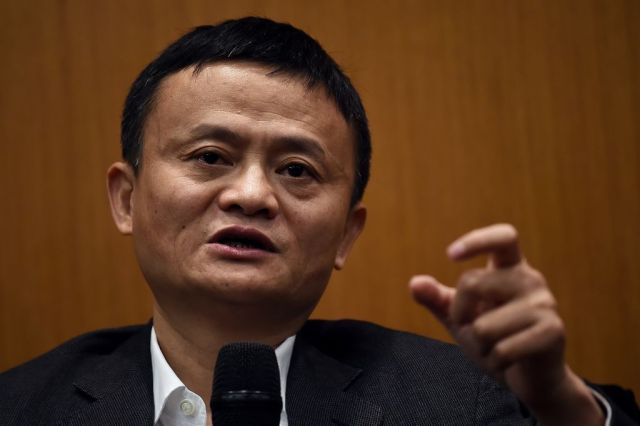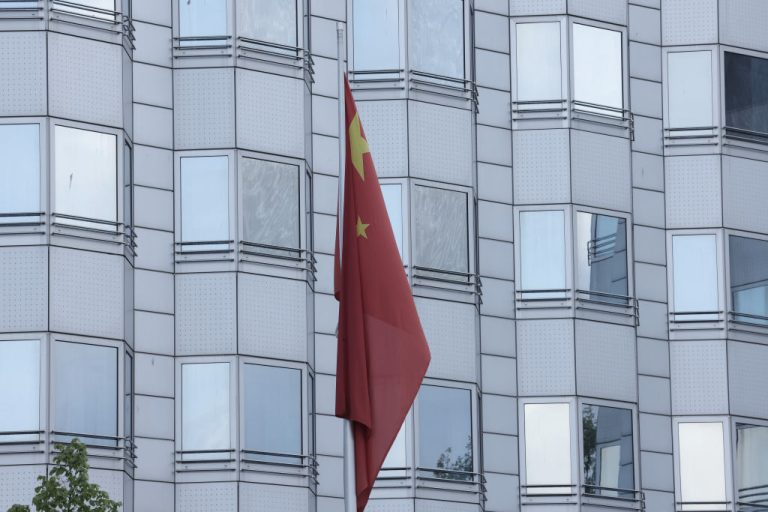China’s leading tech company in the crossfire between rival Communist Party factions
In many ways, Alibaba Group is the face of China’s tech industry, penetrating every aspect of Chinese life with its products, from Taobao to Alipay. Alibaba and Tencent, another Chinese Big Tech company, have a combined market capitalization of $1.3 trillion, and almost every major US investment fund has a stake in the company. UBS estimates that slightly more than a third of Alibaba’s shares are held by US investors. But now the tech giant and its founder, Jack Ma, are facing growing trouble in China.
On March 16, Alibaba’s UC browser was taken down from the Android store. The website shows “service adjustment, temporarily not available for download”. The day before, on the annual March 15 evening broadcast by the Chinese state media, UC Browser was criticized for allowing fake medical advertisements. The criticism was aired on a program for raising awareness about consumer rights.
This rationale leaves something to be desired. For example, Baidu, the Chinese version of Google, is filled with far more fake drug ads. This unusual move is likely the result of the Android store cooperating with the Chinese Communist Party’s efforts to dismember Alibaba.
On March 15, the Wall Street Journal broke the news that the media business affiliated with Alibaba was to be split up. Because Beijing is increasingly concerned about Alibaba’s influence in public opinion, it has pressed for the company to reduce its presence in the media industry.
In 2014, Alibaba went public in New York and raised $25 billion, setting a record for the world’s largest IPO (initial public offering) at the time. But on Nov. 3 last year, Alibaba’s Ant Group, which was expected to set another record for the world’s largest IPO, was called off by Beijing in an emergency. The day before this event, China’s four major regulators, namely Beijing’s central bank, the CBRC, the SFC and the State Administration of Foreign Exchange, summoned Jack Ma for an urgent interview.
In The Way of Attack and Defense, a 2017 martial arts film that Jack Ma invested and starred in, he seemed to be predicting his own fate. He beats the world’s top masters, but when he’s in the presence of the Chinese police, he begs his opponent to let him go.
Caught between current and former Party bosses
Success
You are now signed up for our newsletter
Success
Check your email to complete sign up
Last October, at the second Bund Financial Summit in Shanghai, Chinese Vice President Wang Qishan warned of various risks in the Chinese financial system. These included “the crooked path of speculation and gambling, the circuitous side path of financial bubbles,” and “the pernicious path of Ponzi schemes.” “We must insist on preventing and resolving financial risks, and financial security always comes first.“ But later, Jack Ma said at the summit that China does not have “financial systemic risk, there is basically no systemic financial risk in China. On November 3, days after the Bund Financial Summit, it was announced that Alibaba’s IPO had been halted. The fact that Jack Ma dared to refute Xi Jinping’s right-hand man in such a high-profile manner shows that Jack Ma has powerful backers. But who are they?
Since its creation, the CCP has been plagued by factional struggles that spill over into all levels of China’s politics and economy. For Xi Jinping, his greatest enemy is former Party leader Jiang Zemin. Though Hu Jintao was the nominal leader of China from 2002 to 2012, Jiang and his faction held real power during those ten years. Jack Ma’s career started in the Jiang era. Both Alibaba’s shareholding and Ant Financial’s shareholding are intricately tied to the Jiang faction, particularly Jiang Zemin’s close ally, Zeng Qinghong. As a result, Ma’s background is heavily tainted by that of the Jiang faction, Xi Jinping’s chief rival in the Communist Party.
In 2014, Jiang Zemin’s grandson, Alvin Jiang, helped Ma buy back his stake in Alibaba from Yahoo. Alvin Jiang also invested in Ant Financial through Boyu Capital. This suggests a link between Jack Ma and the Jiang faction.
Xi Jinping has recently tightened his control over Hong Kong and the financial system, moves aimed at reducing the influence of the Jiang faction. In late February, it was reported that Boyu Capital, which is run by Alvin Jiang, had left Hong Kong for Singapore.
Xi Jinping came to power in 2012. During his first five years in office, he has purged hundreds of high-ranking officials. A review of the backgrounds of these fallen officials shows that the vast majority rose through the ranks during the Jiang Zemin era. Since the start of Xi Jinping’s second term in office in 2017, there has been a steady stream of criticism of Xi, both inside and outside China. Especially in the last two years, there have even been calls from within the Party for Xi to step down. Almost all of these voices, which spread quickly via the media, are linked to Jiang Zemin’s faction, which remains powerful even after the purges. When Jack Ma challenged Xi publicly at the Shanghai Financial Summit, was he speaking on behalf of the Jiang faction?
Forays into the Chinese media landscape
Alibaba’s media operation is a powerful force in its own right. The sum of its listed media holdings total $8 billion. For example, Alibaba holds nearly 30 percent of Weibo; it has acquired 100 percent of Hong Kong’s English-language outlet, the South China Morning Post; and has bought 20 percent of the China operations of international PR giant WPP Group. WPP Group is the world’s largest advertising and communications group, which includes public relations advertising giants Burson-Marsteller, Ogilvy & Mather, and a host of other companies. Burson-Marsteller is very powerful in brand PR and media PR. Ogilvy & Mather is a world-renowned advertising company and one of the top 500 brands in the world.
In 2014 and 2015, Alibaba took a stake in China’s leading social media; music and video platforms; and film and TV industry drama heads. In 2014 and 2015, it acquired a 60 percent stake in a TV and film company, Culture China, and changed its name to Ali Pictures.
In 2016, Jack Ma’s Ant Financial invested 20 million yuan in Caixin, one of China’s most influential financial media outlets. Prior to that, Alibaba already held 37 percent of Caixin’s shares and controlled to some extent another influential financial media in China, “First Financial.” Also in 2016, Alibaba further increased its stake in Sina Weibo, and established a new media company with Xinhua, the Communist Party’s media outlet.
Such a deep partnership between Alibaba Group and the CCP media effectively gives Alibaba a relationship with more than a dozen influential official media outlets under the Xinhua umbrella.
In 2017, Alibaba entered the international public relations field. It bought a 20 percent stake in the China business of WPP Group, the international PR giant.
In 2018, Ali invested in the “Chinese Culture Group”. The media giant also has a number of well-known media companies under its umbrella.
In 2019, Alibaba took a stake in the video platform BiliBili, becoming its fourth-largest shareholder. In 2020, after acquiring Focus Media, Alibaba also took a stake in Hunan TV’s Mango Super Media.
Threatening the CCP’s monopoly on public opinion
In China, most professionals in the media industry are almost directly or indirectly related to Alibaba. Beyond this publicly available information, it is difficult to count the number of film and television, media, advertising and public relations companies that Alibaba actually owns, has a stake in and participates in. It has become a super media conglomerate, rivaling even the state media controlled by the Chinese Communist Party.
One example of Alibaba’s media influence is said to have shocked Xi Jinping. Last April, when then-Alibaba executive Jiang Fan cheated on his wife, Jiang’s wife posted a warning to him on Weibo. The incident was covered by several mainland media outlets and quickly became a hot topic on the Internet. But within a few minutes, all media reports and Weibo messages were deleted.
Alibaba owns about 30 percent of Weibo, making it the social media company’s second largest shareholder. Who in China is qualified to do this kind of massive online deletion on Weibo? Normally, such an order would only be given by the Chinese Cyberspace Administration, yet in this case, Weibo did it on its own, without state intervention. Clearly, Alibab was pulling the strings. Xi Jinping could hardly have expected that a private company would be able to gain so much power under China’s authoritarian regime.
On March 18 2021, 11 Chinese companies, including Tencent, Alibaba, and Zigzag, were interviewed by the State Internet Information Office. The Cyberspace Administration has asked these companies to cooperate with it and do a better job of monitoring online information. Previously, Clubhouse, a U.S. voice chat social networking software, and Signal, an encrypted messaging application, were banned by the Chinese Communist Party. Big tech products from the West, like Google, Facebook, and Twitter, have long been restricted from the mainland Chinese market.
Media and public opinion has always been one of the CCP’s main tools for maintaining its power. For Jack Ma to wield so much influence over the media makes Beijing uncomfortable. Even though Alibaba would be unlikely to launch a coup or take similarly drastic action on its own, it could still pose a threat to Xi Jinping if Jack Ma were to cooperate with Xi’s rivals in the Chinese regime.
In a March 11 article, the Wall Street Journal quoted officials familiar with the concerns of the Party leaders. The sources said that Beijing was open to working with Alibaba to reserve the current plans for breaking the company up. The condition for this would be that Alibaba draws a clear line between itself and Jack Ma, and follows the Party’s instructions more closely. According to the officials, the CCP would prefer to leave Alibaba intact, because it is a tech giant that is popular with both Chinese households and global investors.
The Financial Times cited data from flight-tracking firm Radarbox showing that Jack Ma is still free to travel around the country and can continue to use his Gulfstream jet, which confirms that Jack Ma is not completely out of the game. The fact is that the Jiang family is not the only one who helped Ma make his fortune, but other powerful families as well. Xi Jinping will need to tread carefully in handling Alibaba. But this does not mean that the future of Alibaba Group is optimistic.
Alibaba, big data, and authoritarian security
Like the Big Tech companies in America, Alibaba is in essence a data-collection company. Its purpose is not to sell goods, but to obtain all the data of retail and manufacturing; to do logistics is not to deliver packages, but to combine these data together. Clearly, Jack Ma believes in the idea that data, not oil, will be the world’s key resource.
For the Chinese Communist Party, big data is also its most valued resource, as it helps it with its goal of absolute control. For a private enterprise to manage this data is unacceptable, unless that enterprise is under the full control of the CCP.
On March 15, just after the Chinese government’s Two Sessions, Xi Jinping immediately convened a meeting of the Finance and Economics Committee, where he stressed the need to “strengthen the construction of a data property rights system and ensure responsibility of online platform enterprises for data security.” Additionally, Xi said that the Party must “enhance the authority of supervision,” and that “all financial activity should be included in financial supervision.”
A regulatory storm is coming to China’s online platforms. For private Internet business owners, not only is it likely that data will be required to be fully handed over to the Party. Ownership of online businesses is also likely to change hands.
At a Foreign Ministry press conference on March 16, a reporter with Bloomberg asked whether the Chinese government has asked Alibaba to sell its media assets, including the South China Morning Post in Hong Kong. The Chinese Foreign Ministry spokesman, Zhao Lijian, said he “didn’t know” the situation, but didn’t deny it outright. His words can be read as a subtle confirmation. In February, Tencent Vice President Zhang Feng was detained by Chinese officials. There is speculation that Tencent could be the next target of Chinese financial supervision, becoming the second Alibaba.
If the Chinese Communist Party goes after big tech companies like Alibaba and Tencent, what will the consequences be for Wall Street?
In 2014, Alibaba raised $25 billion in a New York IPO, and four of the six major investment banks in the IPO were Wall Street financial giants: Morgan Stanley, JPMorgan Chase, and Deutsche Bank, in addition to Credit Suisse and Deutsche Bank in Europe. Morgan Stanley, JPMorgan Chase, Goldman Sachs and Citigroup. According to Alibaba’s 2014 IPO filing, Alibaba’s six lead underwriters, as well as institutions that subscribed for Ali shares through the underwriters, could have earned an additional $9.2 billion from the Ali IPO that day.
A planned IPO for Ant Group was called off in 2019. Documentation from the IPO prospectus disclosed that Ant issued approximately 1.839 billion Class C shares to 45 foreign investors in June 2018. The foreign investors holding Class C shares include Singapore’s GIC and Temasek Holdings, Malaysia’s Khazanah Nasional, and the world’s most prominent sovereign wealth funds such as the Canada Pension Plan, the Board of Trustees of the University of California, as well as pension and education investment funds; they also a large number of leading U.S. investment banks and their executives.
Foreign capital, including U.S. financial giants, provided approximately $14 billion in funding for Ant’s Class C financing.
On January 12 of this year, RWR Consulting released a report revealing that the Chinese Communist Party is developing a military cloud computing system by combining companies such as Alibaba and Tencent with equipment suppliers and Chinese companies that develop high-tech weapons. Alibaba, Tencent and Baidu are among the largest cloud service providers in China.
From December 2020 to this January, the US government was embroiled in a debate over whether to expand the blacklist of “Chinese Communist military enterprises.”
Despite allegations that Alibaba, Tencent and Baidu, three Chinese technology giants, were working with the Chinese Communist Party’s military and intelligence services, the U.S. Treasury Department strongly opposed adding them to the blacklist, fearing that sanctions would lead to a massive sell-off and other serious economic consequences. Alibaba and Tencent have a combined market capitalization of $1.3 trillion, and almost every major U.S. investment fund has a stake in them. UBS estimates that slightly more than one-third of Alibaba is owned by U.S. investors, while 12 percent of Tencent is owned by U.S. investors.
On January 14, the U.S. Department of Defense officially announced the latest expansion of its “military-related blacklist.” The list does not include Alibaba, Tencent and Baidu. Wall Street
In China’s unique political environment, no company or individual has any real room for security or growth, even one as large as Alibaba Group and as rich as Jack Ma.
Over the past few decades, international capital has tasted the sweetness of making a lot of money from Chinese companies, but it has also gradually tied its fate more and more tightly to the Chinese Communist Party. As Jack Ma walks on the knife edge of China’s red politics, other companies, investors, and governments need to consider their future actions in China carefully as the political storms approach.
By Lin Chen







